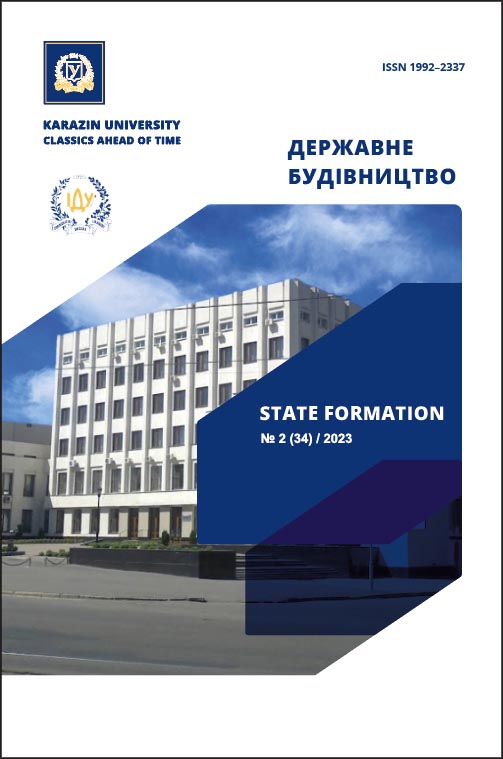Mechanism of State Management of Sustainable Development of Regions
Abstract
The modern organizational restructuring of state power in Ukraine creates corresponding challenges for the country itself, its regions, business and individual citizens. This especially applies to the issue of efficiency and their permanent interaction in the context of ensuring sustainable development. Under such conditions, increasing the effectiveness of the existing state management mechanisms is relevant for the sustainable development of regions in Ukraine for several reasons. Firstly, the presence of martial law in Ukraine imposes additional challenges and demands on public administration. Also, developed digital technologies for providing administrative services have great potential for improving the accessibility and quality of services for citizens and businesses. Digitalization can significantly simplify and speed up the processes of providing administrative services, reduce bureaucratic barriers and improve interaction between authorities and citizens.
The article examines the peculiarities of functioning and the main directions of application of the regional state management mechanism in the context of sustainable development. This is taking into account the modern view of its components and ensuring efficiency. The components of the mechanism of state management of sustainable development of regions (functional components, tools and principles) and the peculiarities of their interrelationship are substantiated. The selected principles can serve as a basis for effective state management of the sustainable development of regions and contribute to achieving a balance between economic, social and environmental development.
A theoretical generalization of the features of the implementation of state management tools for the sustainable development of regions in Ukraine has been carried out. The specifics of urban and rural areas and their inclusiveness were taken into account.
In the modern approach to the construction and implementation of the mechanism of state management of the sustainable development of regions in Ukraine under martial law, the following should be taken into account: adaptability to unforeseen situations, ensuring security and stability, involvement of the local community.
Downloads
References
Blyznyuk, A.S., Asoian, E.Sh. (2022). The mechanism and direction of stateeconomic policy transformation in modern socio-economic conditions. State Formation, 2(32), 29–40. DOI: https://doi.org/10.26565/1992-2337-2022-2-03 [in Ukrainian]
Dziundziuk, V.B., Zhidkov, K.S. (2022). Local management networks as a factor of sustainable development. State Formation, 1(31), 33–45. DOI: https://doi.org/10.26565/1992-2337-2022-1-03 [in Ukrainian].
Dyachenko, S. (2021) Kontsept mekhanizmu derzhavnoho upravlinnia: suchasni pidkhody [The concept of the state administration mechanism: modern approaches]. State Building. No. 1. рр. 1-12.
Eremicheva, L. (2017) Neil Walker: Sustainable development goals are everyone's business. Hromads'kyj Prostir, available at : https://www.prostir.ua/?focus=nil-voker-tsili-staloho-rozvytku-tse-sprava-kozhnoho
Lelechenko, A. (2019), “Approaches for the formation of a regional sustainable development policy in the european union”, Derzhavne upravlinnya: udoskonalennya ta rozvytok, [Online], vol. 12, available at: http://www.dy.nayka.com.ua/?op=1&z=1660 DOI: https://doi.org/10.32702/2307-2156-2019.12.58
Mykhailovska, O.V. (2020). Teoretychni aspekty komunikatsiinoi vzaiemodii v nautsi publichnoho upravlinnia [Theoretical spects of Communication Interaction in he Science of Public Administration]. Teoriia ta praktyka derzhavnoho upravlinnia–Theory and practice of Public Administration, 4, 32–37. DOI: https://doi.org/10.34213/tp.20.04.04 [in Ukrainian].
Pikhniak, T.A. (2021). Suchasni vyklyky dlia ekonomichnoho rozvytku maloho pidpryiemnytstva v Ukraini [Modern challenges for the economic development of small business in Ukraine].Pryazovskyi ekonomichnyi visnyk – Priazovsky Economic Bulletin, 2(25),24–29. DOI: https://doi.org/10.32840/2522-4263/2021-2-5 [in Ukrainian].
Stativka, N.V., Bublii, M.P. (2020). Henezys naukovykh uiavlen pro rol derzhavy v upravlinni sotsialno-ekonomichnym rozvytkom [Genesis of Scientific Ideas About the Role of the State In Managing Socio-Economic Development]. Teoriia ta praktyka derzhavnoho upravlinnia –Theory and practice of Public Administration, 4, 16–23. DOI: https://doi.org/10.34213/tp.20.04.02 [in Ukrainian].
Khojayan, A.R. (2019). Criteria for determining the priorities of structural changes in the economy. Economic Bulletin, no. 1, 73–85. https://doi.org/10.33271/ev/65.073 [in Ukrainian].
Khriapynskyi, A.P. (2022).Spheres ofinfluence and tools for implementing hybrid threats: models and mechanisms.State Formation,2(32), 60–67.DOI: https://doi.org/10.26565/1992-2337-2022-2-06[in Ukrainian].
Shpykuliak, O.H., Ihnatenko, M.M. & Shvets, A.A. (2021). Kontseptualni otsinky realizatsii zasad inkliuzyvnoho rozvytku silskykh terytorii za uchasti ahrokholdynhovykh intehrovanykh formuvan [Сonceptual assessment of the implementation of the principles of inclusive rural areas development with the participation of agroholding integrated formations]. Ekonomika APK, 3, рр. 97 – 111 [In Ukrainian]. https://doi.org/10.32317/2221-1055.202103096
Shuvanov, A.R. (2022). Ukrainian regional policy and its influence on the structure of national economy. State Building Formation, 2(32), 50–59. DOI: https://doi.org/10.26565/1992-2337-2022-2-05 [in Ukrainian].
Shchur, N.O. (2020). Stanovlennia hromadianskoho suspilstva v konteksti suchasnykh vyklykiv suspilnoho rozvytku.Investytsii: praktyka ta dosvid,no.17–18. URL: http://www.investplan.com.ua/?n=17-18&y=2020. DOI: https://doi.org/10.32702/2306-6814.2020.17-18.96 [in Ukrainian].
Mergel, I. (2012) Social Media in the Public Sector: A Guide to Participation, Collaboration and Transparency in The Networked World. San Francisco, Creative Commons License. CA. 320 p. [in USA].
Scharpf, F. (2019). Governing in Europe. Effective and Democratic? Oxford: Oxford University Press. https://doi.org/10.1093/acprof:oso/9780198295457.001.0001

